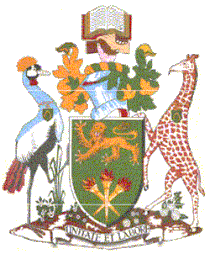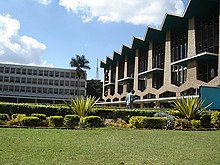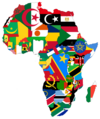| This article contains promotional content. Please help improve it by removing promotional language and inappropriate external links, and by adding encyclopedic text written from a neutral point of view. (June 2017) (Learn how and when to remove this message) |
 Coat of Arms of the University Coat of Arms of the University | |
| Former name |
|
|---|---|
| Motto | Latin: Unitate et labore |
| Motto in English | "In unity and work" |
| Type | Public |
| Established | 1 July 1970; 54 years ago (1970-07-01), as University of Nairobi |
| Parent institution | Formerly the University of London and the University of East Africa |
| Chancellor | Prof. Patrick Verkooijen |
| Vice-Chancellor | Professor Stephen Kiama |
| Undergraduates | 35,897 |
| Postgraduates | 11,003 |
| Address | University Wy, Nairobi, Kenya, Nairobi, Kenya 1°16′47″S 36°49′00″E / 1.27972°S 36.81667°E / -1.27972; 36.81667 |
| Campus | Urban |
| Colors | Sky blue |
| Affiliations | ACU |
| Website | www |
The University of Nairobi (uonbi or UoN; Swahili: Chuo Kikuu cha Nairobi) is a collegiate research university based in Nairobi and is the largest university in Kenya. Although its history as an educational institution dates back to 1956, it did not become an independent university until 1970. During that year, the University of East Africa was split into three independent universities: the Makerere University in Uganda, the University of Dar es Salaam in Tanzania, and the University of Nairobi in Kenya.
During the 2023 academic year, the university had 49,047 students, of whom 35,897 were undergraduates and 11,003 were postgraduates. The university launched several policy frameworks and introduced self-funded enrollment (also called 'module 2') to cope with the rising demand for higher education in Kenya.
Establishment
The inception of the University of Nairobi dates back to 1956, with the establishment of the Royal Technical College, which admitted its first group of A-level graduates for technical courses in April of the same year. The Royal Technical College was transformed into the second university college in East Africa on 25 June 1961 by the Scottish mathematician Professor James Morton Hyslop, formerly of the University of Witwatersrand under the name Royal College of Nairobi. It joined the University of London's 'schemes of special relations' and began preparing students in the faculties of Arts, Science and Engineering for University of London award degrees. Meanwhile, students in other faculties such as the Faculty of Special Professional Studies (later renamed Faculty of Commerce) and Faculty of Architecture continued to offer diplomas for qualifications of professional bodies/institutions.
On 20 May 1964, the Royal College of Nairobi was renamed University College Nairobi as a constituent college of the Federal University of East Africa. During this time, enrolled students studied for college degrees awarded by the University of East Africa instead of the University of London. In 1970, it transformed into the first national university in Kenya and was renamed the University of Nairobi. The university tops in Kenya's university ranking. It is ranked 7th in Africa and 1698 in the world according to Webometrics Ranking of World Universities.
History



The idea of an institution for higher learning in Kenya goes back to 1947 when the Kenyan colonial government drew up a plan for the establishment of a technical and commercial institute in Nairobi. By 1949, this plan had grown into a concept aimed at providing higher technical education for Kenya. In September 1951, a Royal Charter was issued to the Royal Technical College, Nairobi and the foundation stone of the college was laid in April 1952.
During the same period, the Asian community was also planning to build a college for Arts, Science and Commerce as a memorial to Mahatma Gandhi. To avoid duplication of efforts, Gandhi Memorial Academy Society partnered with the colonial government. Thus, the Gandhi Memorial Academy was incorporated into the Royal Technical College, Nairobi in April 1954, and the college proceeded to open its doors to the first intake of students in April 1956.
Soon after the arrival of students at the college, the pattern of higher education in Kenya came under scrutiny. Through the recommendation of a working party formed in 1958, chaired by the Vice-Chancellor of the University of London, Sir John Lockwood, the Royal Technical College, Nairobi was transformed. On 25 June 1961, the college became the second university college in East Africa, under the name "Royal College Nairobi."
The Royal College Nairobi was renamed "University College, Nairobi" on 20 May 1964. On the attainment of "University College" status, the institution prepared students for bachelor's degrees awarded by the University of London, while also continuing to offer college diploma programmes. The University College Nairobi provided educational opportunities in this capacity until 1966 when it began preparing students exclusively for degrees of the University of East Africa, with the exception of the Department of Domestic Science. With effect from 1 July 1970, the University of East Africa was dissolved and the three African countries of Kenya, Uganda and Tanzania each had its own national universities. This development saw the birth of the University of Nairobi set up by an Act of Parliament. Since 1970, the university had grown from a faculty based university serving a student population of 2,768 to a college focused university serving over 68,000 students.
In 2001, the first Confucius Institute in Africa opened as a collaboration between University of Nairobi and Tianjin Normal University in China.
Profile
It is a body corporate established under the Universities Act 2012 of the Laws of Kenya and the Charter.
Through module II and III programmes, opportunity has been opened to thousands of Kenyans and foreigners especially from Sudan, on a paying basis, who meet university admission requirements, but who have not been able to access university education due to restricted intake into the regular programmes that is determined by limited resource allocation by Government. In addition to the regular, evening and, weekend programmes, classes are conducted at the University's Extra-Mural Centres located at the country's county headquarters.
The university is admitting students to undertake courses in the proposed Koitalel Arap Samoei University College for law, business management and education courses that began in January 2015. This is a joint project of the County Government of Nandi and the University of Nairobi.
Restructuring
The university underwent a major restructuring in 1983, resulting in decentralization of the administration, by the creation of six colleges headed by principals. Further, in 2021, the university was further restructured to faculties headed by Deans, phasing out the colleges.
Faculties
- Veterinary Medicine
- Arts & Social Sciences
- Science and Technology
- Law
- Agriculture
- Business and Management Science
- Education
- Engineering
- Built Environment and Design
- Health Sciences
Departments
- Agricultural Economics
- Food Science, Nutrition And Technology
- Land Resource Management And Agricultural Technology
- Plant Science & Crop Protection
- Linguistics, Languages and Literature
- History and Archeology
- Philosophy and Religious Studies
- Library and Information
- Art and Design
- Architecture
- Real Estate, Construction Management and Quantity Surveying
- Urban and Regional Planning
- Business Administration
- Finance & Accounting
- Management Science and Project Planning
- Educational Management, Policy and Curriculum Studies
- Educational Foundations
- Educational Communication And Pedagogical Studies
- Educational and Distance Studies
- Physical Education And Sport
- Mechanical and Manufacturing Engineering
- Civil and Construction Engineering
- Electrical and Information Engineering
- Environmental and Biosystems Engineering
- Geospatial and Space Technology
- Dental Sciences
- Nursing Sciences
- Public and Global Health
- Surgery
- Human Anatomy and Physiology
- Clinical Medicine and Therapeutics
- Paediatrics and Child Health
- Obstetrics and Gynaecology
- Human Pathology
- Psychiatry
- Diagnostic Imaging and Radiation Medicine
- Medical Microbiology and Immunology
- Pharmacy
- Chemistry
- Computing and Informatics
- Mathematics
- Physics
- Biology
- Earth and Climate Sciences
- Biochemistry
- Anthropology, Gender and African Studies
- Economics, Population and Development Studies
- Sociology, Social Work and African Women Studies
- Political Science, Diplomacy and Public Administration
- Journalism and Mass Communication
- Public Health, Pharmacology and Toxicology
- Veterinary Anatomy and Physiology
- Animal Production
- Clinical Studies
- Veterinary Pathology, Microbiology and Parasitology
Rankings
| University rankings | |
|---|---|
| Global – Overall | |
| QS World | 1001–1200 (2024) |
| THE World | 1201–1500 (2024) |
In 2023, Times Higher Education ranked the university within the 1201–1500 band globally.
Notable alumni
See also: Category:University of Nairobi alumni- Kawango Agot, researcher and HIV specialist
- Elijah Ateka, Professor of Plant Virology
- Avril, singer and actress
- Stellah Wairimu Bosire-Otieno, physician and corporate executive
- Ali Rasso Dido, National Assembly member
- Rigathi Gachagua, Deputy president of Kenya
- Zipporah Gathuya, pediatric anesthesiologist
- Githinji Gitahi, physician and Global Chief Executive Officer, Amref Health Africa
- Robert Gichimu Githinji, Member of Parliament
- James Gita Hakim, professor of medicine, cardiologist and HIV clinical trialist
- Patrick R. D. Hayford, diplomat, former Ghana Ambassador to South Africa(1997–1999), Director of African Affairs in the Executive Office of United Nations (UN) Secretary-General Kofi Annan(1999–2005)
- Philo Ikonya, author and human rights activist
- Wahu Kagwe, singer, actress, songwriter, entertainer
- Jacob Kaimenyi, former Cabinet Secretary Education, Lands & Natural resources. Academicians
- Eunice Wanjiku Kamaara, academic and religious studies scholar
- Michael Kamau, former Cabinet Secretary
- Dr Jemimah Kariuki, gynaecologist
- Dr Thomas Kariuki, Director of Programmes at the African Academy of Sciences
- Maina Kiai, human rights activist and UN Special Rapporteur
- Stephen Kiama, Vice-Chancellor, University of Nairobi
- Martha Koome, Chief Justice of Kenya
- Felix Koskei, former Cabinet Secretary, Kenya.
- Joseph Ole Lenku, former Cabinet Secretary and Governor Kajiado County.
- P. L. O. Lumumba, Professor of Law
- Wangari Maathai, Nobel peace prize laureate
- Emma Mbua, palaeo anthropologist and curator
- James Wainaina Macharia, Cabinet Secretary.
- Fred Matiangi, former Cabinet Secretary.
- Adan Mohammed, Cabinet Secretary.
- Musalia Mudavadi, former Vice President under President Moi, former Deputy Prime Minister to Rt Hon. Raila Odinga.
- Sylvia Mulinge, corporate executive
- Danson Mungatana, Lawyer and Politician
- Margaret Muthwii, Vice-Chancellor of Pan Africa Christian University
- Willy Mutunga, former Chief Justice of Kenya
- MaryJane Mwangi, corporate executive
- Rosalyn Nandwa, deputy chief of staff to William Ruto
- John Nasasira, Ugandan Cabinet Minister
- Alice Wairimu Nderitu (born 1968), United Nations Special Adviser on the Prevention of Genocide to UN Secretary-General
- Ruth W. Nduati, physician and HIV researcher
- Eva Njenga, physician and first female chair of Kenya Medical Practitioners and Dentists Board
- Freda Nkirote, archaeologist and Director of the British Institute in Eastern Africa (BIEA) and President of the Pan-African Archaeological Association.
- Apolo Nsibambi, Prime Minister of Uganda
- Sylvia Shitsama Nyamweya, neurosurgeon
- Borna Nyaoke-Anoke, physician and medical researcher
- Catherine Nyongesa, physician and radiation oncologist
- Washington Yotto Ochieng, Professor of Engineering at Imperial College London
- Florence Oloo, scientist and professor of chemical sciences
- Troy Onyango, writer and lawyer
- James Orengo, long serving Kenyan legislator and senior counsel.
- Teodosia Osir, lawyer and corporate executive
- Babu Owino, politician
- Henry Rotich, former Finance Cabinet Secretary
- William Ruto, Fifth President of The Republic of Kenya.
- Stephen Sang, constitutional lawyer and the Second Governor of Nandi County
- Josephine Sinyo, lawyer, politician and disability rights activist
- Anne Waiguru, former Cabinet Secretary, and Governor of Kirinyaga County.
- Hassan Wario, anthropologist, former Cabinet Secretary, Kenya and serving Kenyan ambassador.
See also
References
- "1956-Opening of the Royal Technical College of East Africa". UoN. 24 October 1956. Retrieved 16 March 2021.
- Hyslop, James (1960). "Principal of the Royal College of Nairobi (University of Nairobi)". UoN. Retrieved 16 March 2021.
- "Latest News | UNIVERSITY OF NAIROBI". www.uonbi.ac.ke. Retrieved 8 May 2017.
- "Commission for University Education – Status Of Universities (Universities Authorized to Operate in Kenya) – Status Of Universities (Universities Authorized to Operate in Kenya)". www.cue.or.ke. Retrieved 25 May 2020.
- "Students | University of Nairobi". www.uonbi.ac.ke. Retrieved 5 July 2022.
- Ngala, John. "The rot that is Nairobi University halls of residence". Standard Digital News. Retrieved 8 May 2017.
- "Annual Report" (PDF). University of Nairobi. 2011. Retrieved 10 May 2017.
- "Browsing Vice-chancellors by Author "Hyslop, James, Morton"". erepository.uonbi.ac.ke.
- Royal College of Nairobi
- Gregory, Robert G. (5 July 2017). The Rise and Fall of Philanthropy in East Africa: The Asian Contribution. Routledge. pp. 129–142. ISBN 978-1-351-47506-8.
- "Nairobi University eyes Sh500m fund to sponsor high potential". Daily Nation. Retrieved 8 May 2017.
- Shinn, David H.; Eisenman, Joshua (2023). China's Relations with Africa: a New Era of Strategic Engagement. New York: Columbia University Press. ISBN 978-0-231-21001-0.
- "Latest News – UNIVERSITY OF NAIROBI". uonbi.ac.ke.
- "Governance Reforms: VC presents a new Governance Structure for UoN on 14th July 2021 | Office of the Vice-Chancellor | University of Nairobi".
- "Home | Faculty Of Veterinary Medicine". Vetmedicine.uonbi.ac.ke. Retrieved 17 April 2022.
- "University of Nairobi | FACULTY OF ARTS AND SOCIAL SCIENCES". Socialsciences.uonbi.ac.ke. Retrieved 17 April 2022.
- "Uon | Faculty Of Science & Technology". Sciencetechnology.uonbi.ac.ke. Retrieved 17 April 2022.
- "Home | Faculty Of Law". Law.uonbi.ac.ke. Retrieved 17 April 2022.
- "Home | Faculty Of Agriculture". Agriculture.uonbi.ac.ke. Retrieved 17 April 2022.
- "University Of Nairobi | Faculty Of Business And Management Sciences". Business.uonbi.ac.ke. Retrieved 17 April 2022.
- "UoN | Faculty of Education". Education.uonbi.ac.ke. Retrieved 17 April 2022.
- "Welcome | Faculty Of Engineering". Engineering.uonbi.ac.ke. Retrieved 17 April 2022.
- "Built Environment | Faculty Of The Built Environment And Design". Built-environment.uonbi.ac.ke. Retrieved 17 April 2022.
- "Faculty of Health Sciences | FACULTY OF HEALTH SCIENCES". Healthsciences.uonbi.ac.ke. Retrieved 17 April 2022.
- "Agrieconomic | Department Of Agricultural Economics". Agrieconomics.uonbi.ac.ke. Retrieved 17 April 2022.
- "foodtech | Department of Food Science, Nutrition & Technology". Foodtech.uonbi.ac.ke. Retrieved 17 April 2022.
- "Home | Department Of Land Resource Management & Agricultural Technology". Larmat.uonbi.ac.ke. Retrieved 17 April 2022.
- "Department of Plant Science & Crop Protection | DEPARTMENT OF PLANT SCIENCE & CROP PROTECTION". Plantscience.uonbi.ac.ke. Retrieved 17 April 2022.
- "University of Nairobi | DEPARTMENT OF LINGUISTICS AND LANGUAGES". Linguistics.uonbi.ac.ke. Retrieved 17 April 2022.
- "University of Nairobi | Department of History & Archeology". History.uonbi.ac.ke. Retrieved 17 April 2022.
- "University of Nairobi | Department of Philosophy & Religious Studies". Philosophy.uonbi.ac.ke. Retrieved 17 April 2022.
- "University of Nairobi | Department of Library and Information Science". Dlis.uonbi.ac.ke. Retrieved 17 April 2022.
- "Arts and Design | Department of Art & Design". Arts-design.uonbi.ac.ke. Retrieved 17 April 2022.
- "Architecture | DEPARTMENT OF ARCHITECTURE". Architecture.uonbi.ac.ke. Retrieved 17 April 2022.
- "Archived copy". Archived from the original on 14 August 2021. Retrieved 28 June 2022.
{{cite web}}: CS1 maint: archived copy as title (link) - "Home". urbanplanning.uonbi.ac.ke.
- "Home". businessadmin.uonbi.ac.ke.
- "Home". financeaccounting.uonbi.ac.ke.
- "Home". managementscience.uonbi.ac.ke.
- "Home". eap.uonbi.ac.ke.
- "Home". edufoundations.uonbi.ac.ke.
- "Home". cepa.uonbi.ac.ke.
- "Home". distance-education.uonbi.ac.ke.
- "Home". pes.uonbi.ac.ke.
- "Home". mechanical.uonbi.ac.ke.
- "Home". civil.uonbi.ac.ke.
- "Home". eie.uonbi.ac.ke.
- "Home". ebe.uonbi.ac.ke.
- "Home". geospatial.uonbi.ac.ke.
- "Home". dental.uonbi.ac.ke.
- "Home". nursing.uonbi.ac.ke.
- "Home". sphun.uonbi.ac.ke.
- "Home". surgery.uonbi.ac.ke.
- "Home". humananatomy.uonbi.ac.ke.
- "Home". clinicalmed.uonbi.ac.ke.
- "Home". paediatrics.uonbi.ac.ke.
- "Home". obsgyn.uonbi.ac.ke.
- "Home". humanpathology.uonbi.ac.ke.
- "Home". psychiatry.uonbi.ac.ke.
- "Home". dirm.uonbi.ac.ke.
- "Home". medmicrobiology.uonbi.ac.ke.
- "Home". pharmacy.uonbi.ac.ke.
- "Home". chemistry.uonbi.ac.ke.
- "Home". computerscience.uonbi.ac.ke.
- "Home". mathematics.uonbi.ac.ke.
- "Home". physics.uonbi.ac.ke.
- "Home". biology.uonbi.ac.ke.
- "Home". earthclimatesciences.uonbi.ac.ke.
- "Home". biochemistry.uonbi.ac.ke.
- "Home". african-studies.uonbi.ac.ke.
- "Home". economics.uonbi.ac.ke.
- "Home". sociology.uonbi.ac.ke.
- "Home". politicalscience.uonbi.ac.ke.
- "Home". journalism.uonbi.ac.ke.
- "Home". phpt.uonbi.ac.ke.
- "Home". vetanatomy.uonbi.ac.ke.
- "Home". animalproduction.uonbi.ac.ke.
- "Home". clinicalstudies.uonbi.ac.ke.
- "Home". vetpathology.uonbi.ac.ke.
- "University of Nairobi". QS Quacquarelli Symonds.
- ^ "World University Rankings: University of Nairobi". Times Higher Education. 3 May 2024.
- Vice-Chancellor
External links
 Media related to University of Nairobi at Wikimedia Commons
Media related to University of Nairobi at Wikimedia Commons
